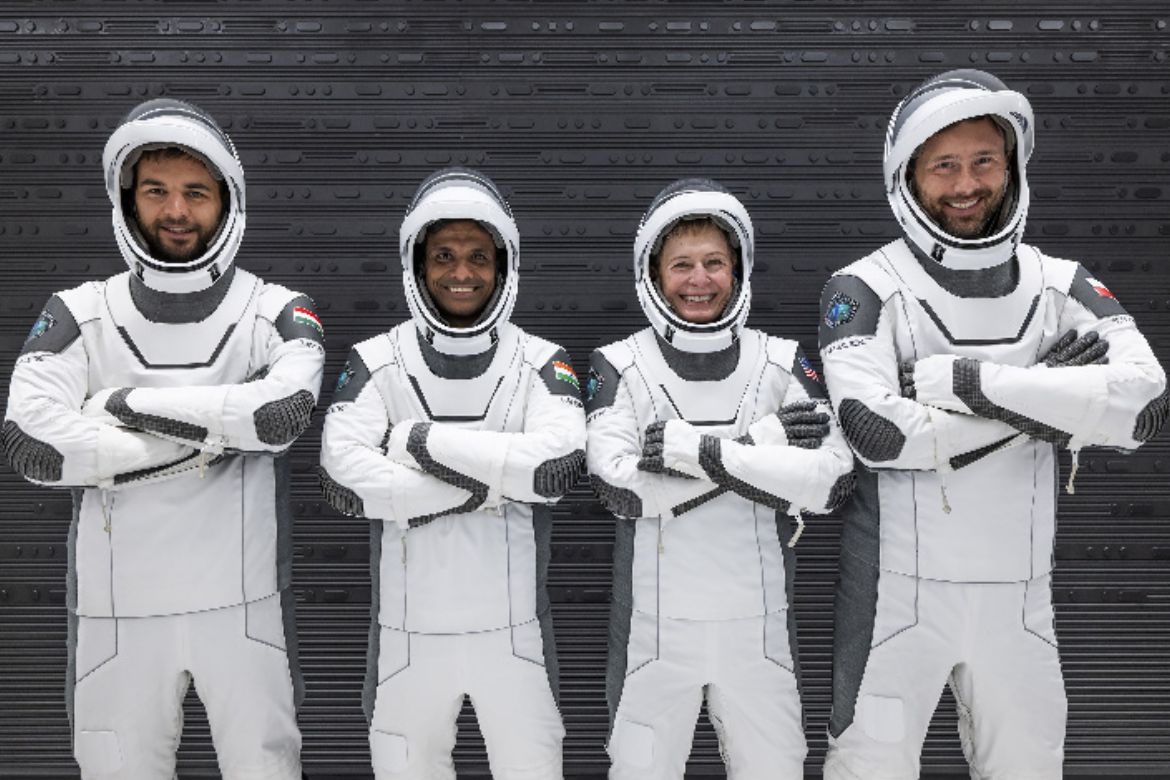India’s long-awaited return to human spaceflight has been momentarily grounded, following a liquid oxygen (LOX) leak detected in a SpaceX Falcon 9 rocket that was meant to carry Group Captain Shubhanshu Shukla—India’s first astronaut in over 40 years—on a historic journey to the International Space Station (ISS).
Originally set for June 11, the launch was part of Axiom Space’s AX-4 mission, operating out of the U.S., and included a four-member international crew. It would have made Shukla the first Indian astronaut on the ISS, marking a monumental leap for India’s commercial space ambitions.
🚫 What Happened?
The mission, already rescheduled once due to poor weather, was abruptly postponed after engineers discovered a LOX leak during post-test inspections. According to SpaceX, the issue emerged after a seven-second hot fire test on the Falcon 9 booster—a reused rocket from earlier Starlink missions.
“Standing down from tomorrow’s Falcon 9 launch of AX-4 to the space station to allow additional time for SpaceX teams to repair the LOX leak,” SpaceX posted on X.
ISRO’s chairman Dr. V. Narayanan confirmed that a decision was made in coordination with SpaceX and Axiom teams to address the leak and retest the booster before greenlighting a new launch date.
🇮🇳 India’s Cosmic Comeback: 41 Years in the Making
If successful, the AX-4 mission will make Shukla only the second Indian in space after Rakesh Sharma‘s historic 1984 flight aboard the Soviet Soyuz.
Shukla, a test pilot in the Indian Air Force, said he was inspired by Sharma’s story since childhood. Speaking through Axiom Space, he shared:
“I grew up reading about him in textbooks. To now follow in his footsteps feels like destiny.”
Unlike Sharma’s Soviet-backed mission, Shukla’s flight is part of a commercial collaboration—a growing trend that reflects the new global space economy.
🌍 The View from the Gulf: Private Spaceflight’s Rising Role
Gulf-based space experts say the delay is routine in the world of human spaceflight, where safety protocols are paramount.
“Private companies like Axiom Space are rewriting the rules,” said Anna Hazlett, founder of UAE-based space consultancy AzurX. “They’re enabling countries like India to fast-track their human spaceflight goals. It’s a model that’s democratising access and accelerating innovation.”
The UAE itself has benefited from such partnerships—most recently through Emirati astronaut Sultan Al Neyadi’s participation aboard a SpaceX mission in 2023, in collaboration with NASA.
🥘 Food, Yoga & Culture in Orbit
Shukla’s mission is not just a scientific one—it’s cultural. The Indian government and DRDO have ensured that traditional Indian meals will accompany the astronaut in space. Space-friendly versions of moong dal halwa, gajar ka halwa, and aam ras will be packed on board.
Shukla also plans to perform yoga aboard the ISS, honoring Sharma’s legacy and demonstrating India’s soft power in space.
“I may showcase a few poses in space,” he said. “But yoga is also about mental strength—something we need for a mission like this.”
🤝 Crew and Collaboration
Shukla’s teammates include an impressive international cast:
- Peggy Whitson (USA), legendary NASA astronaut and mission commander
- Slawosz Uznanski-Wisniewski (Poland), engineer and European Space Agency backup astronaut
- Tibor Kapu (Hungary), biotechnologist and payload specialist
The 14-day mission aboard the ISS is designed to conduct scientific experiments and international outreach, reinforcing the collaborative ethos that defines modern space exploration.
🕒 What’s Next?
SpaceX, Axiom Space, and ISRO engineers are now working around the clock to repair and retest the booster. A new launch date is expected soon, pending range availability and safety validations.
“Delays in human spaceflight are not setbacks—they’re safeguards,” said Hazlett. “This pause shows the maturity of the ecosystem.”
🌌 Gulf and Beyond: A Shared Space Future
As India awaits the rescheduled liftoff, the mission stands as a symbol of global cooperation in the new era of space travel—where Gulf nations, South Asia, and private industry are all rising to meet the final frontier.
From Abu Dhabi to Bengaluru, the message is clear: space is no longer reserved for the superpowers—it’s a shared human ambition.



